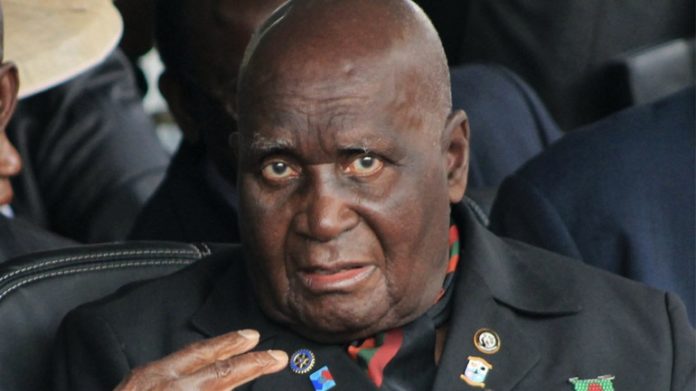Three days after being admitted to a military hospital in Lusaka with pneumonia, Kenneth Kauda, the leader of Zambia’s independence struggle and the first president of the South African country, has died at the age of 97, his sons have announced.
His death was announced at a time when Zambia is suffering from a wave of infections with the new coronavirus.
“He died quietly” yesterday at 14:30 (local time; 15:30 Greek time) at the hospital, confirmed government spokesman Simon Mitty. Authorities declared a 21-day national mourning period.
Rumors had circulated that his condition was critical even before his death was announced, and many in Luzaka had their eyes fixed on their television sets yesterday. A 50-year-old resident of the capital, a member of the parish of the former head of state for 27 years (1964-1991), spoke of a “black day for Zambia”.
Kauda, known simply as “KK”, had also earned the nickname “African Gaddy” for his commitment to non-violent methods of struggle. It led the former British protectorate, known as Northern Rhodesia, to independence without bloodshed in October 1964.
Born on April 28, 1924, the sternum of his family of eight children, the son of a teacher – rare at the time – and missionary of the Scottish Church, who died when he was still eight years old, a teacher and himself, Kaunda was one of the last heroes of the movements for the independence of African states.
During his presidency, Zambia became a one-party state, with total control. He embraced socialist ideology – considered for years close to Moscow – but mixed it with Christian beliefs and traditional African values, creating a particular political doctrine he called “humanism”.
He was praised for building schools and hospitals, areas in which the colonial government never paid attention.
He began his career as the organizing secretary of the African National Congress (ANC) of Northern Rhodesia. But in 1958 he severed ties with the ANC and founded the African National Congress in Zambia (ZANC). The party was outlawed by the colonial authorities a year later and Kauda was jailed for nine months. ZANC became the United Party for National Development (UNIP) in 1959. The following year, after his release from prison, Kaunda was elected president and launched a peaceful campaign of political disobedience, known as “Ts-cha-cha.” A diligent orator, he was inspired, among other things, by the philosophy of Mahatma Gandhi.
In the field of foreign policy, after independence and after his triumphant election as president, Kaunda helped other African independence movements, especially in Zimbabwe and South Africa – he was a sworn enemy of the apartheid regime. Luzaka was the home of Nelson Mandela during the three decades of his exile.
Kenneth Kauda had been criticized for authoritarianism by his opponents, as well as for the way he handled the economy. He banned the opposition in 1973. But he was forced to allow multipartyism again in 1991. In the same year he was defeated by Fredrik Tsilumba of the Party for Multiparty Democracy (MMD) after a particularly hard battle. He accepted defeat by waving his famous white scarf.
Later, the Chilumba government would ban him from participating in politics, revising the Constitution in a photographic way, so that anyone with foreign parents would be considered a foreigner and would not be able to hold public office. The government then tried to deport him, claiming he was a Malawian national. In 1997, he was jailed on Christmas Day, accusing him of being involved in a failed coup. In 1999, he was declared stateless by a court, but appealed to the Supreme Court, which acquitted him the following year.
Following the death of one of his sons from Acquired Immune Deficiency Syndrome, Kaunda would be thrown into a personal crusade to eradicate AIDS. “This is the biggest challenge for Africa. We fought colonialism. “Now we have to fight with the same zeal AIDS that threatens to eradicate Africa,” he told Reuters in 2002.
He had also offered his services in efforts to resolve crises across the continent – in Kenya, Zimbabwe, Togo, Burundi …
All over Africa, roads, buildings, airports bear his name.
Even at a very old age, Kenneth Kauda made public speeches to raise his voice against injustice, especially against the oppression of minority groups.
In one of his rare public appearances in recent years, in September 2019, the 95-year-old Kauda would rise up against attacks on citizens of other African countries in South Africa.
“Our brothers and sisters in South Africa must remember: the very people who are being treated so inhumanely are those who were their comrades-in-arms in the fight against the barbaric regime of apartheid,” he said.
UN Secretary-General Antonio Guterres has expressed his “deep sorrow” over the death of the former Zambian president, expressing his condolences “to his family, to the government and to the people of Zambia”.
The Prime Minister of the United Kingdom Boris Johnson also expressed his condolences to the people of Zambia and his “sorrow” for the death of the former president.
Tambo Becky, praising the deceased, “man of the people”, judged that “we lost a giant in the struggle for the liberation of South Africa and the whole continent.”
For the African Union, the continent “lost one of its best sons.”
Kenneth Cauda’s health deteriorated after his wife, Betty, with whom he had nine children, died in September 2012.
